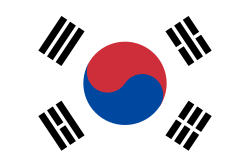
Back التعليم في كوريا الجنوبية Arabic Cənubi Koreyada təhsil Azerbaijani Образование в Южна Корея Bulgarian দক্ষিণ কোরিয়ায় শিক্ষাব্যাবস্থা Bengali/Bangla Schulsystem in Südkorea German Educación en Corea del Sur Spanish آموزش در کره جنوبی Persian Système éducatif en Corée du Sud French दक्षिण कोरिया में शिक्षा Hindi Dél-Korea oktatási rendszere Hungarian
This article has multiple issues. Please help improve it or discuss these issues on the talk page. (Learn how and when to remove these messages)
|
 | |
| Ministry of Education (South Korea) | |
|---|---|
| National education budget (2016) | |
| Budget | 4.6% of GDP[1] |
| General details | |
| Primary languages | Korean |
| Literacy | |
| Total | 100% |
| Male | 100% |
| Female | 100% |
| Primary | 3.3 million[2] |
| Secondary | 4.0 million |
| Post secondary | 3.6 million |
| Attainment | |
| Secondary diploma | 98.0%[3][6][7] |
| Post-secondary diploma | 69.8%[3][4][5] |
Education in South Korea is provided by both public schools and private schools with government funding available for both. South Korea is known for its high academic performance in reading, mathematics, and science. Consistently ranking above the OECD average. South Korean education at ninth place in the world.[8][9] Higher education is highly valued. People believe doing well in school helps them move up in society and have better jobs.
The education system in South Korea is known for being very strict and competitive. Students are expected to get into top universities, especially the "SKY" universitiesare (Seoul National University, Korea University and Yonsei University).[2][10][11] This focus has helped the economy grow and made many people well-educated, but it has also been criticized for stopping creativity, causing mental health problems, and not matching students' skills with available jobs.[12]
The strong pressure and focus on doing well in school have started debates about changing the system.[13][14] People are worried about putting too much importance on university education, looking down on vocational careers, and how competition affects students’ well-being.
- ^ "Government expenditure on education (% of GDP)".
- ^ a b Clark, Nick; Park, Hanna (1 June 2013). "Education in South Korea". World Education News & Reviews. Retrieved 25 June 2015.
- ^ a b "Korea". OECD.
- ^ "Korea" (PDF). OECD. Archived from the original (PDF) on 15 August 2019. Retrieved 15 August 2019.
- ^ "Educational attainment and labour-force status". OECD.
- ^ "International Educational Attainment" (PDF). OECD. p. 4.
- ^ "International Educational Attainment" (PDF). p. 4. Retrieved 27 August 2019.
- ^ "PISA - Results in Focus" (PDF). OECD. p. 5.
- ^ "Korea - Student performance (PISA 2015)". OECD.
- ^ David Santandreu Calonge (30 March 2015). "South Korean education ranks high, but it's the kids who pay". Retrieved 3 July 2015.
- ^ WeAreTeachers Staff. "South Korea's School Success". WeAreTeachers. Archived from the original on 5 July 2015. Retrieved 3 July 2015.
- ^ "Korea Awash with the Under-Skilled and Overeducated". The Chosun Ilbo. 8 December 2011. Retrieved 23 October 2016.
- ^ "South Korean students wracked with stress". 8 December 2013.
- ^ Ripley, Amanda (25 September 2011). "Teacher, Leave Those Kids Alone". Time. Retrieved 4 December 2013.
© MMXXIII Rich X Search. We shall prevail. All rights reserved. Rich X Search